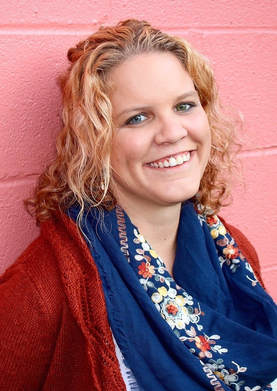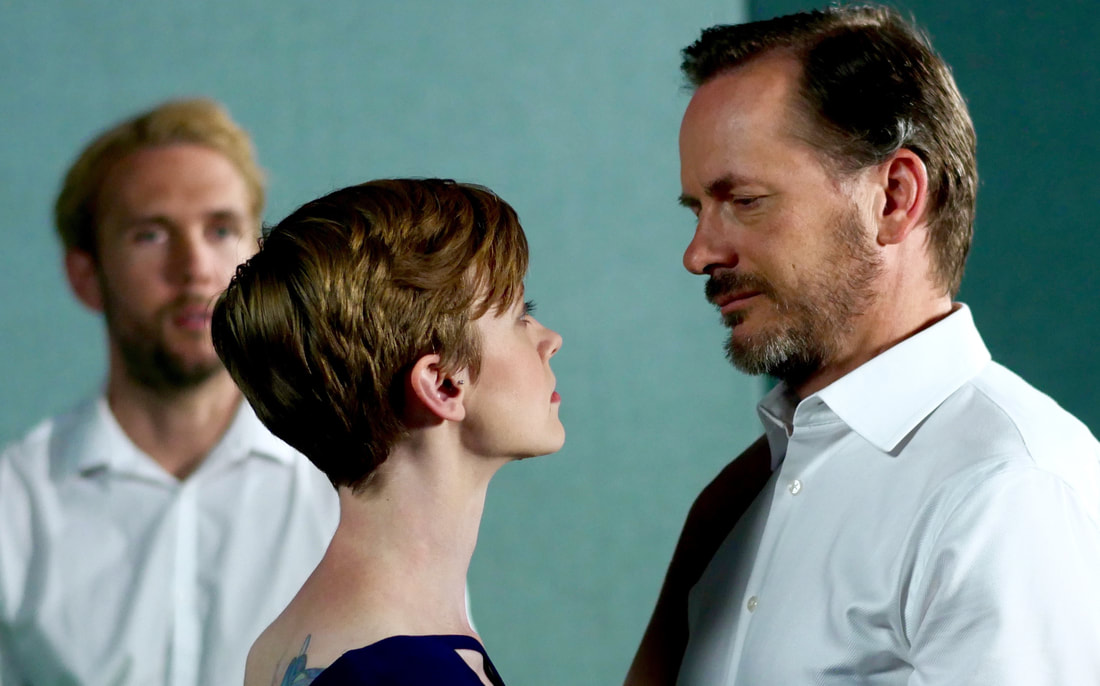ABOUT THE FILIGREE THEATRE
For Press Inquiries, please contact Juice Consulting Public Relations.
Planning, artistic vision guide Filigree Theatre through first season
April 26, 2018
By Andrew J. Friedenthal Special to the American-Statesman
By Andrew J. Friedenthal Special to the American-Statesman
|
Elizabeth V. Newman says Filigree looks for thematic links between classic works and new plays in an effort to appeal to both traditional audiences and younger viewers.
Contributed by Filigree Photo: Special to the American-Statesman |
Careful planning was an important part of Filigree’s first season. Stephanie Moore says she once had a professor who “drilled it into us that even if you’re not a business major, you always have a business plan.”
Contributed by Filigree Photo: Special to the American-Statesman |
The world premiere of “Trio” is the final production in Filigree Theatre’s inaugural season, which was built around the theme of love triangles. Filigree artistic director Elizabeth V. Newman discovered “Trio” on the National New Play Network’s New Play Exchange website. ContributedIt’s difficult to succeed as a new theater company in Austin. With performance and rehearsal space at a premium, funding often nonexistent and a panoply of long-established companies claiming much of the limelight, it can be a major challenge to get a company off the ground. Many an Austin theater group has had a first production; far fewer have made it to a second.
Filigree Theatre, however, is now mounting its third production at the conclusion of an ambitious first season that, by design, featured a fall production from the theater canon, a winter production from a playwright living and working today and a spring production that is a world premiere, all tied together by a shared theme.
“The concept for starting a company with a sense of past, present and future plays connected by a theme as an organizing principle had been kicking around in my head for a little while,” said Elizabeth V. Newman, the company’s co-founder, co-managing director and artistic director who directed all three productions of this first season.
That union of classic and new plays speaks directly to what Newman says is “the anxiety of the past few years about losing audiences. Younger people don’t go to theater, and the people who do go are baby boomers who are aging out and prefer to see things they’re familiar with rather than newer work.”
Elizabeth V. Newman says Filigree looks for thematic links between classic works and new plays in an effort to appeal to both traditional audiences and younger viewers. To try and appeal to both that traditional audience as well as younger viewers, she wanted to “find connections between plays that are part of our collective theater history and new works and new writers that tie back to each other. For audiences that are more familiar with established works and writers, maybe if they understand that there’s a through-line, a thread between what they’re familiar with and people who are working today and things that they’ve never seen yet, then that adds a sense of familiarity. And for audiences who are more accustomed to new works and experimental theater, it can link backward to our shared history of theater.”
Newman and producer Stephanie Moore, co-founder and managing director of the company, worked together to produce a pre-season show, Daniel Arnold and Medina Hahn’s “Any Night,” which they premiered in Los Angeles. When “Any Night” proved a success, they moved on to create the initial season of productions in Austin, which included last fall’s “Betrayal” by Harold Pinter and February’s “A Delicate Ship” by Anna Ziegler.
“Most of our demographics so far have been either in the 36- to 45-year-old range, or college students,” Moore says. “That age range is really nice because that’s sort of the ‘lost generation’ of art, and it’s good to see them coming back to the theater.”
REVIEW: ‘A Delicate Ship’ looks at love in the shape of a triangle
Careful planning was an important part of Filigree’s first season. Stephanie Moore says she once had a professor who “drilled it into us that even if you’re not a business major, you always have a business plan.” Contributed by Filigree Photo: Special to the American-StatesmanPart of Filigree’s success is due to Moore’s behind-the-scenes work, inspired by a “terrifying professor” from Texas State University who, she says, “drilled it into us that even if you’re not a business major, you always have a business plan.” For Moore and Newman, this meant starting out with an advisory board, a public relations plan, careful risk analysis and a close partnership based on shared recognition that parenting needs come before professional needs.
“From the get-go we’ve asked ourselves really tough questions,” Newman says. “Who, exactly, are we? Who are our audience? What is our mission? What are our one-year, three-year, five-year goals? We realized that for season one a lot of it was going to be that the proof is in the pudding, and we had to focus on working our tails off to make the best theater that we could make and holding ourselves to standards of accountability.”
Filigree’s current production, the final work in a season based around the theme of love triangles, is Sheila Cowley’s play “Trio,” which Newman discovered on the National New Play Network’s New Play Exchange website, where theater companies can read playwrights’ work to find pieces that fit their needs and limitations as a company. “Trio” is described on the site as “a play that inspires adventurous theatremakers. The play wrestles with the cycles we all struggle through, as parents die and children have to take their place.”
REVIEW: Secrets, lies and revelations in new theater company’s first production
Cowley herself expands on this, noting, “The play is about changing roles in families, and how your position in the family changes as people die. And this is the endless age-old process that we all wind up going through at a certain point, which is never an easy process, and you’re often thrust into a new role in the family that you weren’t looking for as people pass away.”
This exploration takes the form of three speaking actors and three silent performers telling the story of “a three-way romantic triangle (that) takes shape through swords and masks and monsters,” as two friends, Tim and Leslie, work to create a monster play for children as a way to distract Leslie from her mom’s hospitalization. When “an old college love” intrudes upon their world, Tim and Leslie are forced to “forge a way to face the real world, even if you’re only armed with a wooden sword.”
Newman says the moments of performative creation in “Trio” mirror the themes of love and memory that have been at the heart of the entire season. For instance, there’s a moment where Tim creates for Leslie “an experiential memory to remind her of something beautiful and happy” during a time of sorrow. Indeed, the entire text features “moments where characters just being in each other’s presence causes an intrusion of memories and nostalgia.”
This production is also the next step in what Newman calls a “learning curve” of facing new, unique challenges with each new work. “Whatever the crisis is,” she says, knocking on wood, “we will rise to meet it.” As for what’s driving the co-founders of Filigree to meet those challenges, Moore says, “Part of it is that somebody told us we can’t, so we’re going to prove them wrong.” “Don’t mess with Texas women, right?” Newman says. Moore counters with what might be the secret motto underlying the duo’s successful collaboration: “Nah, just don’t mess with women.”
Filigree Theatre, however, is now mounting its third production at the conclusion of an ambitious first season that, by design, featured a fall production from the theater canon, a winter production from a playwright living and working today and a spring production that is a world premiere, all tied together by a shared theme.
“The concept for starting a company with a sense of past, present and future plays connected by a theme as an organizing principle had been kicking around in my head for a little while,” said Elizabeth V. Newman, the company’s co-founder, co-managing director and artistic director who directed all three productions of this first season.
That union of classic and new plays speaks directly to what Newman says is “the anxiety of the past few years about losing audiences. Younger people don’t go to theater, and the people who do go are baby boomers who are aging out and prefer to see things they’re familiar with rather than newer work.”
Elizabeth V. Newman says Filigree looks for thematic links between classic works and new plays in an effort to appeal to both traditional audiences and younger viewers. To try and appeal to both that traditional audience as well as younger viewers, she wanted to “find connections between plays that are part of our collective theater history and new works and new writers that tie back to each other. For audiences that are more familiar with established works and writers, maybe if they understand that there’s a through-line, a thread between what they’re familiar with and people who are working today and things that they’ve never seen yet, then that adds a sense of familiarity. And for audiences who are more accustomed to new works and experimental theater, it can link backward to our shared history of theater.”
Newman and producer Stephanie Moore, co-founder and managing director of the company, worked together to produce a pre-season show, Daniel Arnold and Medina Hahn’s “Any Night,” which they premiered in Los Angeles. When “Any Night” proved a success, they moved on to create the initial season of productions in Austin, which included last fall’s “Betrayal” by Harold Pinter and February’s “A Delicate Ship” by Anna Ziegler.
“Most of our demographics so far have been either in the 36- to 45-year-old range, or college students,” Moore says. “That age range is really nice because that’s sort of the ‘lost generation’ of art, and it’s good to see them coming back to the theater.”
REVIEW: ‘A Delicate Ship’ looks at love in the shape of a triangle
Careful planning was an important part of Filigree’s first season. Stephanie Moore says she once had a professor who “drilled it into us that even if you’re not a business major, you always have a business plan.” Contributed by Filigree Photo: Special to the American-StatesmanPart of Filigree’s success is due to Moore’s behind-the-scenes work, inspired by a “terrifying professor” from Texas State University who, she says, “drilled it into us that even if you’re not a business major, you always have a business plan.” For Moore and Newman, this meant starting out with an advisory board, a public relations plan, careful risk analysis and a close partnership based on shared recognition that parenting needs come before professional needs.
“From the get-go we’ve asked ourselves really tough questions,” Newman says. “Who, exactly, are we? Who are our audience? What is our mission? What are our one-year, three-year, five-year goals? We realized that for season one a lot of it was going to be that the proof is in the pudding, and we had to focus on working our tails off to make the best theater that we could make and holding ourselves to standards of accountability.”
Filigree’s current production, the final work in a season based around the theme of love triangles, is Sheila Cowley’s play “Trio,” which Newman discovered on the National New Play Network’s New Play Exchange website, where theater companies can read playwrights’ work to find pieces that fit their needs and limitations as a company. “Trio” is described on the site as “a play that inspires adventurous theatremakers. The play wrestles with the cycles we all struggle through, as parents die and children have to take their place.”
REVIEW: Secrets, lies and revelations in new theater company’s first production
Cowley herself expands on this, noting, “The play is about changing roles in families, and how your position in the family changes as people die. And this is the endless age-old process that we all wind up going through at a certain point, which is never an easy process, and you’re often thrust into a new role in the family that you weren’t looking for as people pass away.”
This exploration takes the form of three speaking actors and three silent performers telling the story of “a three-way romantic triangle (that) takes shape through swords and masks and monsters,” as two friends, Tim and Leslie, work to create a monster play for children as a way to distract Leslie from her mom’s hospitalization. When “an old college love” intrudes upon their world, Tim and Leslie are forced to “forge a way to face the real world, even if you’re only armed with a wooden sword.”
Newman says the moments of performative creation in “Trio” mirror the themes of love and memory that have been at the heart of the entire season. For instance, there’s a moment where Tim creates for Leslie “an experiential memory to remind her of something beautiful and happy” during a time of sorrow. Indeed, the entire text features “moments where characters just being in each other’s presence causes an intrusion of memories and nostalgia.”
This production is also the next step in what Newman calls a “learning curve” of facing new, unique challenges with each new work. “Whatever the crisis is,” she says, knocking on wood, “we will rise to meet it.” As for what’s driving the co-founders of Filigree to meet those challenges, Moore says, “Part of it is that somebody told us we can’t, so we’re going to prove them wrong.” “Don’t mess with Texas women, right?” Newman says. Moore counters with what might be the secret motto underlying the duo’s successful collaboration: “Nah, just don’t mess with women.”











